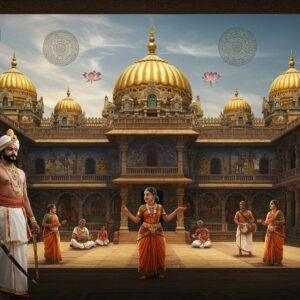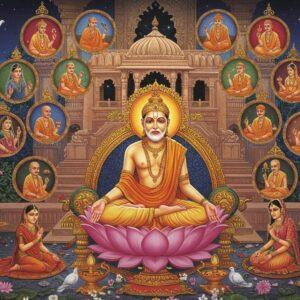
Immerse yourself in the profound world of Dvaita Vedanta, a prominent philosophical school within the Vedanta tradition of Hindu philosophy. This philosophy has deeply influenced India’s spiritual and cultural landscape. It emphasizes dualism and offers unique perspectives on understanding the self and the divine. Explore the core beliefs that distinguish Dvaita Vedanta from other Vedantic traditions, such as Advaita Vedanta and Vishishtadvaita Vedanta.
Historical Background of the Dvaita School of Vedanta
Understanding Dvaita Vedanta’s Origins and Evolution
The Dvaita Vedanta school emerged in the 13th century, founded by the influential philosopher Madhvacharya (1238-1317). Madhvacharya, who considered himself an avatar of Vayu, the wind-god, embarked on a lifelong quest for spiritual understanding, culminating in the creation of this unique school of thought. Amidst the socio-political dynamics of medieval India, Dvaita Vedanta arose as a distinct philosophical perspective. Madhvacharya’s writings, including insightful commentaries on the Brahmasutras and the Bhagavad Gita, became foundational texts. His Tattvavada doctrine, emphasizing a dualistic worldview, set Dvaita Vedanta apart. The transmission of his teachings was ensured by dedicated disciples and followers who preserved and propagated his philosophical insights through generations. Explore more about Hindu Philosophy at Hindu Philosophy Explained: A Beginner’s Guide.
Significance of Dvaita Vedanta
Dvaita Vedanta’s Impact on Culture, Religion, and Society
Dvaita Vedanta’s influence on Indian culture, religion, and philosophy is profound and enduring. Its emphasis on devotion to a personal god contributed significantly to the Bhakti movement. The teachings of Dvaita Vedanta shaped temple rituals and practices, particularly in the regions of Karnataka and Udupi. Philosophical dialogues between Dvaita and other Vedantic schools underscore its distinct dualistic interpretation of sacred scriptures. Dvaita Vedanta offers a theological framework for understanding the complexities of evil and suffering, providing solace and insight into divine will. Even today, Dvaita Vedanta resonates with those seeking a deeper, more personal connection with the divine. You can delve deeper into Hindu symbolism with our resource on Hindu Symbols Explained: Their Meanings and Importance.
Core Beliefs and Philosophical Tenets
Exploring the Dualistic Perspective of Dvaita Vedanta
Dvaita Vedanta rests upon fundamental principles that highlight its dualistic nature. The concept of Vishishtadvaita, or qualified non-dualism, acknowledges the independent existence of both God and individual souls, yet distinguishes their nature. Central to Dvaita Vedanta are the Panchabheda, the five-fold differences: between God and souls, God and matter, souls and matter, amongst individual souls, and amongst elements of matter. This framework emphasizes the distinct identities within the universe. In Dvaita Vedanta, God is perceived as a supreme, personal entity, separate and distinct from the universe and individual souls. This understanding influences the concepts of liberation (moksha) and karma, placing emphasis on bhakti (devotion) as the path to spiritual enlightenment. Divine grace, according to Dvaita, plays a pivotal role in the attainment of liberation. For further exploration of Hindu philosophy and the journey towards connecting with your inner self, you can visit Connecting With Your Inner Self: A Hindu Philosophy Guide.
Dvaita Vedanta in Practice
Integrating Tradition into Daily Life
Dvaita Vedanta, with its focus on dualism, profoundly shapes the lives of its followers. Udupi, Karnataka, serves as a prominent center of Dvaita practice and tradition. The Udupi Krishna Temple stands as a significant spiritual hub for devotees. Its rituals and festivals are rich expressions of devotion to Lord Krishna, an avatar of Vishnu. Celebrations like Krishna Janmashtami are vibrant with reverence, featuring hymns, prayers, and traditional dances. These practices are not mere rituals; they embody the profound devotion (bhakti) that is central to Dvaita. Education and scriptural study are essential aspects of Dvaita Vedanta. Institutions in Udupi preserve and transmit the teachings of Madhvacharya. Students delve into sacred texts like the Brahmasutras and the Bhagavad Gita. Community gatherings and discourses foster shared learning and spiritual growth. Devotees discuss scriptural interpretations and philosophical insights within a supportive environment. In the digital age, technology extends the reach of Dvaita teachings. Online platforms offer lectures and workshops, making these teachings accessible to a global audience. Translating key texts into Hindi makes them more accessible to Hindi-speaking communities. While translation poses challenges, it broadens access and understanding. These efforts ensure that Dvaita Vedanta continues to inspire and guide individuals on their spiritual journeys. Poojn.in provides resources and products that can support your spiritual practices, including holy books, clothing, and other puja samagri. Browse our collection of Holy Books, Holy Clothing, and Flammables to enhance your spiritual practice.
Embracing Dvaita in Everyday Life
Dvaita Vedanta provides a timeless framework for integrating tradition into contemporary life. By engaging in rituals, studying scriptures, and embracing technology, devotees keep the teachings of Madhvacharya vibrant and relevant. This dualistic philosophy fosters a sense of community and supports spiritual growth. Embracing Dvaita Vedanta is about continuing a legacy of devotion and wisdom, making it accessible to future generations. Through understanding and practice, Dvaita becomes a way of life, offering spiritual clarity and peace in a constantly evolving world.
How Poojn.in Supports Your Dvaita Vedanta Practice
Poojn.in offers a curated selection of items that align with Dvaita Vedanta principles and practices:
- Vishnu Worship Items: Find complete puja sets specifically designed for Lord Vishnu worship, including bells, deepams (lamps), and brass items integral to Dvaita traditions. Consider the Clay Doat for Saraswati Puja for your devotional practices.
- Sacred Texts: Access authentic copies of Madhvacharya’s works and other essential Dvaita philosophical texts, many with accurate translations. Explore the Srimad Bhagavad Gita (Bengali Version).
- Tulasi Care Items: Given Tulasi’s significance in Dvaita, we offer specialized pots, stands, and maintenance supplies to support your Tulasi worship. Browse our Decoratives section for related items.
- Pure Materials: Our copper and brass items are guaranteed pure, adhering to Dvaita requirements for worship materials. Explore our range of Falcon brand products for high-quality brass items.
- Puja Accessories: Find traditional items like sandalwood paste, kumkum, and specific flowers recommended for Vishnu worship. Check out our Pure Kalwa (Off-White Raksha Sutra) for your puja needs.
Visit www.poojn.in or call 7908548235 to place your order and experience convenient doorstep delivery across India. All products come with quality assurance and authenticity certificates.
Shop now at Poojn.in for all your Dvaita tradition worship needs
FAQs on Dvaita School of Vedanta
What is the Dvaita School of Vedanta? It’s a Hindu philosophical tradition emphasizing the dualism between the individual soul (jiva) and the supreme being (Brahman), founded by Madhvacharya in the 13th century.
Who founded the Dvaita School? Madhvacharya, a South Indian philosopher and theologian, established this school, highlighting the distinction between jiva and Brahman.
What is its central belief? Dvaita Vedanta’s core tenet is the fundamental difference between God and the individual soul, emphasizing the soul’s dependence on God.
Why is it significant? It offers a unique perspective on the divine-individual relationship, providing a clear, distinct understanding of God and the soul compared to other Vedanta schools.
How does it differ from other Vedanta schools? Unlike Advaita’s non-dualism and Vishishtadvaita’s qualified non-dualism, Dvaita firmly upholds dualism, stressing the eternal separation of jiva and Brahman.
What are its central texts? Key texts include Madhvacharya’s works like “Anuvyakhyana” and commentaries on the Bhagavad Gita and Brahma Sutras.
How can I learn about it in Hindi? Many resources exist, including translated texts and online platforms offering courses and lectures in Hindi.
What is its historical background? Originating in 13th-century India, Madhvacharya’s teachings spread widely through his travels and the continued efforts of his disciples.


